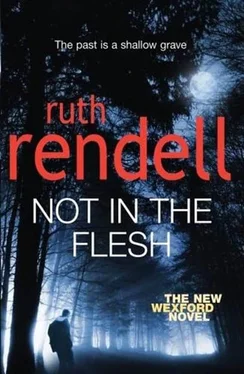Her “Oh, Pop, you promised!” sounded very much the sort of thing she used to say when she was five. It still went straight to his heart. Her follow-up remark was a little more mature. “Having a detective chief inspector there would mean so much to them.”
He tried a ridiculous reproof in Hannah's style, political correctness gone mad, and said, “I question whether you ought to refer to an ethnic minority as ‘them,’ Sheila.”
Her indignant reaction made him laugh. “You know I didn't mean-”
“I'll do my best to be there.”
Barry Vine had gone to Cardiff, Lyn Fancourt driving him, to secure the DNA sample promised by Dilys Hughes, née Darracott. Wexford's own attention had been turned to Douglas Chadwick, his forays into the Internet assisted by Hannah. He couldn't have done it without her. The address Kathleen Grimble had given him was in Nottingham, a street that sounded as if in a poor neighborhood. Hannah frowned when he used those words, fearing worse to come.
“Okay, did you ever hear of a Violet Grove in an upmarket residential area?”
“Well, if you put it like that…”
“Number fifteen Violet Grove. The family name is or was Dixon.”
“ ‘Was’ is right, guv. There's a Marilyn P. Williams and a Robert A. Greville there now.”
Wexford sighed. “I suppose we'll have to go up there or get the Nottingham police in on this. Someone in the street may remember him. Do we know what he was doing in Flagford?”
Hannah had pursued the questioning of Kathleen Grimble with some difficulty. “He was a student at Myringham University, guv. I've been on to them and they said he'd attended the university from 1993 to 1996.”
Wexford thought of the piano playing. “A music student?”
“Mechanical engineering. The degree is a BSc MEng.”
“He'd have been a mature student, over forty. Is there some record somewhere, I mean some register, of people with degrees in that?”
“I can find out, guv.”
While her fingers trawled through the Internet, he thought about the clothes that had been found in the house, the under-clothes on the body, the scorpion T-shirt, orange anorak, jeans and socks, the sneakers, which had been piled up on the kitchen counter. Why had this man, whoever he was, Chadwick or Darracott or Charlie Cummings, taken off his clothes and his shoes in the kitchen and gone barefoot down to the cellar in his underwear? Because he was looking for something? In that case, why not go down there fully clothed?
Hannah said, “The Engineering Council is responsible for regulating the engineering profession.” She was reading from the screen. “They run the National Register of Chartered Engineers. But wait a minute-once you've got your degree you have to go into something called the Monitored Professional Development Scheme and that's another four years. I'd no idea getting to be an engineer took so long, had you, guv?”
“I can't say I've ever thought about it.”
“These MPDS people have got a membership Web page. Bear with me and I'm sure I'll find something.”
“And meanwhile,” said Wexford, “I've got a meeting with Carina Laxton.”
She looked like a child with a prematurely lined face. Her pale hair was worn in two sparse plaits, her face free of makeup, her round glasses the kind that a myopic eight-year-old might wear. The white coat she wore had greenish stains down the front that were somehow more repellent than blood would have been. Not usually particularly sensitive to the squeamishness of policemen, she had for once covered up the remains on the table.
“What did he die of?” Wexford asked.
Carina raised her almost invisible eyebrows. “How d'you know it was a man?”
“The size, the clothes in the kitchen. The body was wearing men's underwear.”
“Okay. Jumping to conclusions a bit, weren't you? Still, it was a man. I don't know what he died of. It's difficult when someone's been dead so long. Quite possibly a natural death. Might have been his heart or a stroke. I can't tell because there's no heart and not much soft tissue in the skull. One thing I can tell you. He was a tall man, exceptionally tall. You're so out-of-date I know you don't care for the metric system, so say between six feet three and six feet five.”
“How old was he?”
“Mid-forties. Maybe forty-five. No more than fifty. As for when he died, it was between seven and ten years ago.”
“Not so long as the other one, then?”
“You said it, not me,” said Carina. “Ask me again when I've done a more thorough job on him. I'll know more, I hope.”
He faced the media, told them most of what he knew about the two bodies without mentioning the error they had made in taking a DNA sample from someone who could not in fact be related to the dead man. He told them about the clothes without producing them. A description, he felt, was enough: a white T-shirt with a black scorpion printed on it, blue jeans, black sneakers diagonally banded in gray, gray socks. He also said the purple sheet needed identifying, the one which had wrapped the body in the trench.
Hannah caught up with him as he was leaving the building at five past seven. He had just reached the automatic doors that had tentatively begun to open and closed again as he turned back.
“Chadwick's not registered as a chartered engineer, guv, and he's not on the MPDS register. But then I realized. We assumed it was a three-year degree course, but it's not, it's four years. He was only at the university till 1996, so it looks as if he dropped out.”
“Or was killed,” said Wexford.
“Or was killed, guv. It makes it more likely it's him, doesn't it?”
It took him a quarter of an hour to drive to Forby. He took the last remaining space in the village hall car park and walked up the steps to the front doors where a notice told him this would be the inaugural meeting of the Kingsmarkham African Women's Health Action Group. He had hoped to slip in unobtrusively and listen to the proceedings from a seat at the back, but he was no sooner inside than he was caught by his daughter Sylvia, who seized him by the arm and hustled him up onto the stage.
A modicum of presence of mind enabled him to say how seriously the police took the problem of female genital mutilation and how much they would rely on the Somali community helping them in their task of prevention rather than prosecution. As he repeated the platitudes, meaningless promises that he had said and heard said a dozen times, he realized how little he really knew about this kind of circumcision. The applause from the audience rang hollowly in his ears as he stepped down from the platform and took the empty seat next to his wife. He had described it to her because she asked him, seen her face grow pale and heard her say, “But, Reg, it can't be! Not millions of women,” and he had to say it was so without knowing more than the bare physiological facts.
Sheila was on the platform now, speaking about the early migrations of young women from the Horn of Africa. When British doctors and midwives had to carry out antenatal examinations, they at first believed that what they saw was congenital malformation and so routinely performed cesarean sections. She then out-lined, to an audience who mostly knew what she was talking about at firsthand, how little girls, sometimes babies, had their labia and clitoris cut away with razors or sharp stones and the skin stitched up over the wound. Wexford had begun to feel slightly sick and looking around the room, wondered how many of these women had suffered in infancy or girlhood what had just been described.
Five or six seats away from him and a row behind sat the young waitress Matea whom Burden had so admired. It made him shudder to think that she might, in all probability, have suffered this. He knew that he shouldn't consider it a worse affront to a beautiful girl than to a plain one and he castigated himself. It was outrageous whoever might be the victim. There were more speakers, one talking about a conference on this subject she had attended in Kenya, another setting out what could be done to stop the practice here. Then the speeches ended and the audience was invited to ask questions. An elderly woman at the back put up her hand. Plainly she was more likely to have been from Sewingbury than Somalia, her hair was whitish-blond and her skin self-tanned. She asked if it wasn't wrong to interfere with a community's ancient traditions, and Wexford was pleased with Sheila's answer.
Читать дальше











